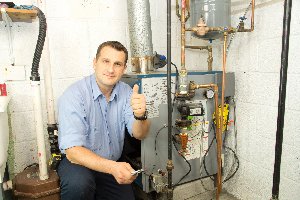A Homeowner’s Guide to Routine Furnace Maintenance
You may not think about your furnace often during the majority of the year. But when temperatures start to drop, you rely on your heater to keep your home safe and comfortable regardless of the weather outside.
Healthy furnace units provide the most reliable and most efficient heat, so keeping up with routine maintenance is vital to your unit’s life and your comfort. In this blog, we guide you through common furnace maintenance questions.
When to Schedule Furnace Maintenance
While it’s important to have your furnace maintenance handled by a reputable HVAC technician, it’s equally important to service your furnace when the unit needs it. Below are some guidelines to help you identify when your unit needs service.
Annually
Before you turn your furnace on for the first time in the fall or winter, have the unit professionally inspected and cleaned. This service ensures that none of the unit’s components have broken, corroded, or warped during the off season.
Additionally, regular cleanings reduce unpleasant furnace odors, maximize unit performance, and help identify minor issues before they develop into potentially dangerous problems.
Schedule this service in early or mid-fall. Remember, the longer you wait to make an appointment, the longer you’ll have to wait for service. During the late fall and early winter, more homeowners will also need unit inspections and you might have to wait longer or pay more for an inspection.
As-Needed
Furnace units undergo a lot of thermal stress. When a problem arises, you’ll need to address it as soon as possible to ensure that a single broken piece doesn’t damage the whole unit or endanger your family’s health.
Schedule a repair visit if you notice the following:
- The furnace makes banging, squealing, or whistling noises.
- The unit switches itself off frequently.
- You have to turn the thermostat up much higher than usual.
- Your energy bills are significantly higher than last year.
- Your home has drafts and cold areas.
Take note of when the problem appeared and how often it happens. For example, if your unit is noisy when it runs for several hours but not when it first turns on, let your HVAC contractor know.
Every 15 to 20 Years
Like any appliance, your furnace will eventually become too old to function properly. Most homeowners need to replace their unit once every 15 to 20 years depending on the furnace type and condition.
You should also consult your owner’s manual and the contractor who installed your furnace for recommendations specific to a unit of your furnace’s age and fuel type.
What to Expect During Furnace Service Calls
When you schedule a furnace inspection, cleaning, or repair, the process generally proceeds as follows.
Scheduling
Depending on how full your HVAC technician’s schedule is, he or she may be able to give you an appointment within two days or two to three weeks of your initial call. Most contractors complete many projects over the course of a workday, so your appointment may be a time range rather than a definitive time.
Plan to be available for the entire scheduled time range if possible. Additionally, make sure that you clear an easy path from your front entry to your furnace and that you entertain your kids and pets elsewhere.
Most routine service calls last between 30 and 60 minutes, but you should plan for a major repair or full replacement to take several hours.
Service
During the service, your HVAC technician will inspect the condition of the unit. In most cases, a routine furnace maintenance call will include:
- Blower, fan, and belts inspection
- Electrical connection checks
- Filter replacement
- Flue clearing
- Heat exchanger inspection
- Motor lubrication
- Safety control testing
- Start-up cycle testing
- Thermostat calibration
As the technician checks each component, he or she will clean and make repairs as needed.
Report and Recommendations
Once your contractor finishes the tasks listed above, he or she provides you with a full written report. If your furnace is in good working condition, the report simply notes any preventative maintenance steps that were taken, such as replacing the filter.
If your furnace needs repairs outside the parameters of a general inspection, your contractor will make recommendations for your next step. In some cases, he or she may be able to handle the repairs immediately, but you may need to make a future appointment instead.
The report also includes an invoice so you know where any individual costs of the service came from. Keep the report and invoice for your records so you can compare your furnace’s condition from year to year. Some contractors also include suggestions for improving your system’s performance and lowering your energy bills throughout the year.
Keep your furnace well-maintained to ensure that you have the heat you need all winter long.
Need a furnace inspection, repair, or replacement? Trust the experts at C.B. Lucas Heating & Air Conditioning. We specialize in furnace services for both electric and gas units.
When homeowners have a stubborn clog, most turn to over-the-counter products like Drano to solve their issues without calling a plumbing company. Unfortunately, chemical solutions...


